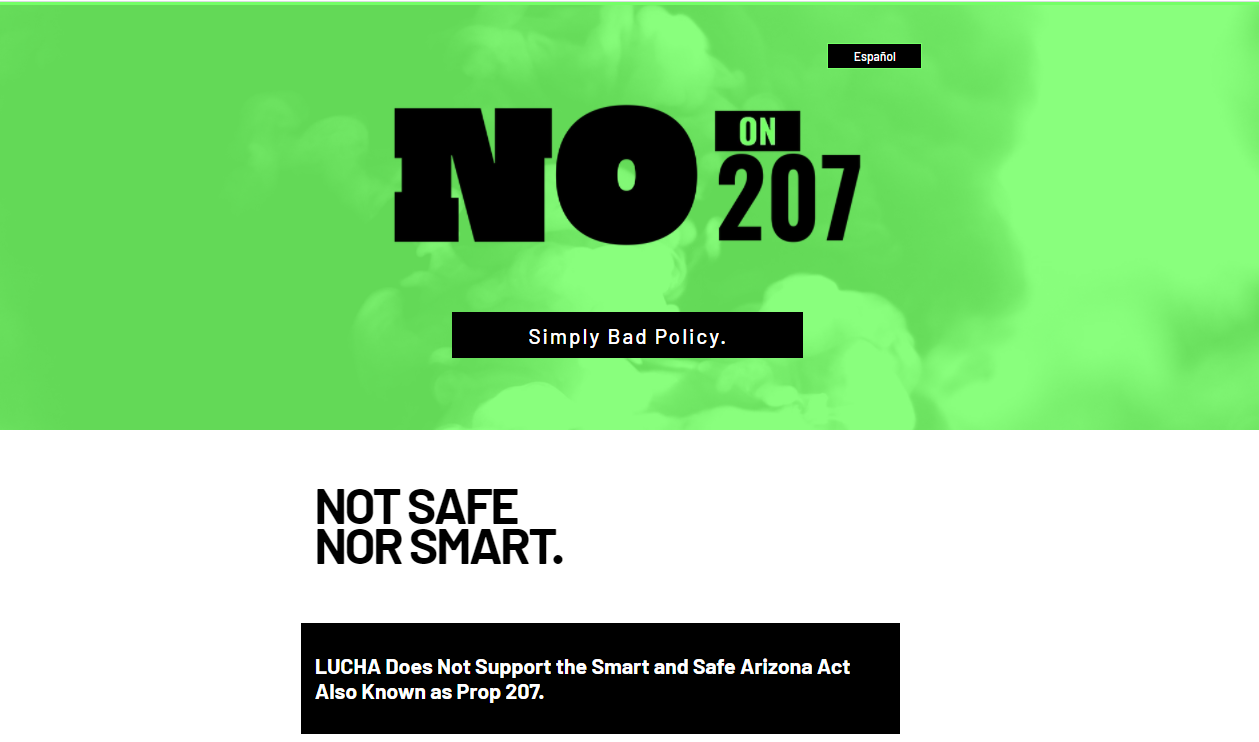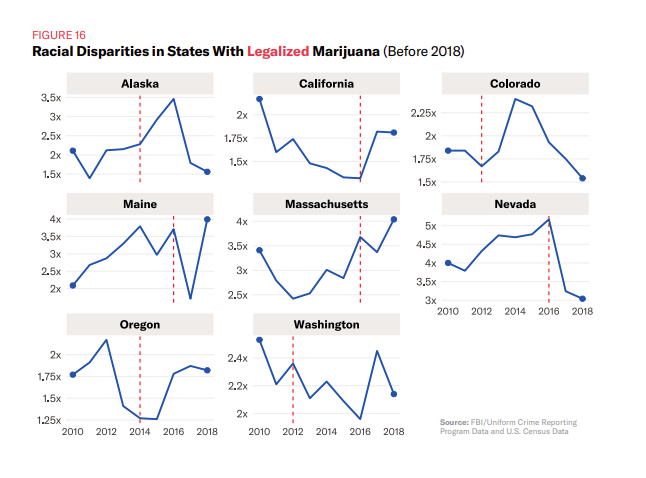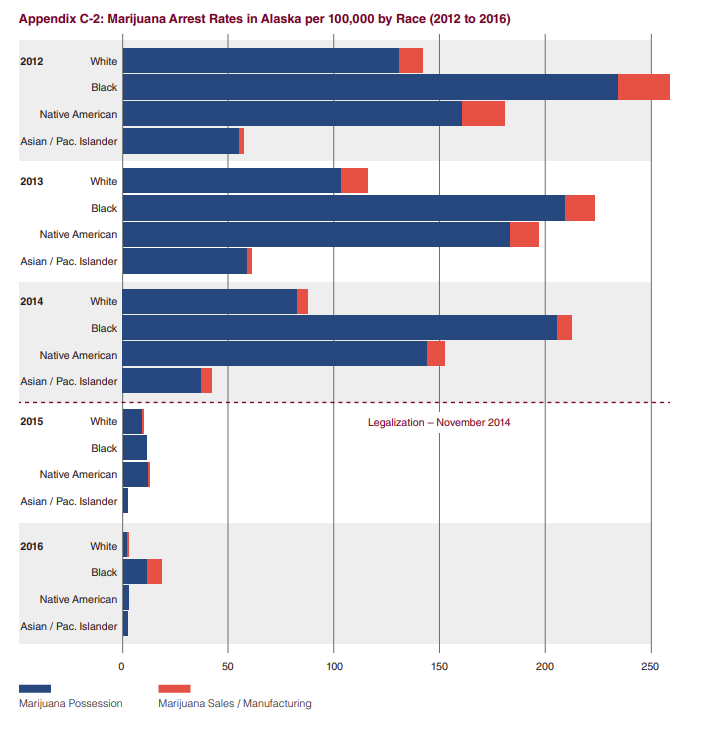
Screenshot

Audio By Carbonatix
A progressive group, Living United for Change in Arizona (LUCHA), has spent $74,000 on a last-minute purchase of ads opposing Arizona’s proposition to legalize recreational marijuana use.
LUCHA co-executive director Tomás Robles said the group supports legalization but doesn’t think Proposition 207 goes far enough to address the racist impacts of cannabis prohibition.
“We can do better,” he said.
The group has been prioritizing other contests, Robles said, but took out the ads now because they’ve been receiving questions about their position on Proposition 207.
LUCHA alleges that the proposition lacks a clear pathway for removing past marijuana convictions from records, that the current industry would leave little room from people of color to obtain licenses, and that nearly one-third of tax revenue from recreational sales would go to police.
Stacy Pearson, the campaign manager for the pro-207 campaign, blasted LUCHA’s position and accused the group of being misleading.
“They’ve got some fundamental flaws in their logic,” she said.
She said LUCHA’s position was “nauseating” because it meant the group was willing to sacrifice the up to 200,000 people who may be eligible to have their records expunged, plus the thousands arrested each year for possessing small amounts of marijuana, on the basis of a couple hundred dispensary licenses.
“None of our work is over. But continuing with prohibition is the stupidest thing we could do,” Pearson said.
Robles thinks running a more progressive initiative in a few years would draw wider support, and said the group’s concerns spring in part from the fact that Arizona’s constitution requires a legislative super-majority to amend a voter-approved initiative.
“But we’re talking about the Arizona State Legislature here,” he said, adding, “…We don’t want to come across as antagonizers saying this initiative is a horrible initiative. We just don’t agree with it.”
However, LUCHA’s digital campaign is more strident, labeling the initiative “simply bad policy” and urging readers to vote against it. The concerns LUCHA raises are very real: states that have legalized recreational marijuana are still seeing enforcement disproportionally impact people of color, who are at the same time shut out of leadership roles in the burgeoning industry.

While overall arrests fell, racial disproportionalities actually got worse in many states after marijuana legalization.
ACLU
Still, some of the claims on the group’s website don’t quite add up.
For one, the website claims that Arizona will only offer expungement – removing a past conviction from a person’s record – if new legislation is passed. It’s true Arizona does not currently offer a true expungement for past offenses, instead offering a “set aside.” The “set aside” process vacates a conviction and restores the rights of the person convicted, but does not remove the initial conviction from their record.
However, Proposition 207’s expungement provision goes much further than that and resembles how true expungement provisions work in other states. It orders agencies to seal the information that a conviction occurred to everyone but defendants and their attorneys.
“It provides the new legislation” needed to make Prop 207’s expungement section work, Pearson said, calling LUCHA’s claim a lie.
“They know that. They were there” at the drafting table when the language was put together, she added.
Prop 207 also allows prosecutors and the state Attorney General to proactively petition for expungement on behalf of people convicted by their office. A similar provision in California allowed prosecutors in Los Angeles County to request the expungement of 66,000 conviction. Maricopa County Attorney candidate Julie Gunnigle has said she would pursue the same mass expungements if elected, although other county’s prosecutors have been much more hostile to marijuana use.
Robles said the LUCHA’s involvement in the drafting process greatly improved the criminal justice aspects of the initiative, but that they never committed to supporting it. He pointed out that the expungement process depends on the approval of prosecutors, some of who have tried to go after medical marijuana patients for legal usage, and that there’s no guarantee on what current Maricopa County Attorney Allister Adel will do if she remains in office.
Another shortcoming that would exacerbate Robles’ concerns is that expungement applies solely to charges of possession of certain amounts, cultivation, or possessing paraphernalia, leaving people convicted of marjiuana-related infractions besides those out of luck and with barriers to entering the new industry.

While racial disparities remained, the overall number of people arrested for marijuana offenses dropped dramatically in all racial groups after Alaska legalized marijuana in 2014.
Drug Policy Alliance
In other states, legalization has not stopped racial disparities from occurring during enforcement of other offenses.
“So we’re not actually fixing the systemic issues of why people get stopped with marijuana,” Robles said.
States that legalized marjiuana have seen racial disproportionalities remain, but the overall rates of arrests dropped dramatically across all racial groups. A 2020 ACLU report found that early legalization states had the lowest racial disproportionalities in marijuana arrests – although Black people were still two times as likely to be arrested in some states – and while many states saw spikes in the racial disproportionality of arrests after legalization, a number have since seen the disproportionality drop to below pre-legalization levels.
LUCHA claims that nearly one-third of funding generated by the initiative will go to police. However, the section the group appears to be referencing also includes distributing funding to fire departments as well as police agencies and sheriff offices.
Either way, a large chunk of money going to police when K-12 and other needs were underfunded isn’t acceptable, Robles said. In January, they could live with that, but as American opinions around police brutality have evolved in the last six months, LUCHA can no longer support that, he said.
When asked if it was misleading to not mention that the money is not solely allocated to police, Robles pointed out that the pro-207 campaign had put up signs with photos of the Grand Canyon and no obvious reference to marjiuana.
“For me, when I look at this initiative I look at the long-lasting effects of a voter-protected initiative,” he said.